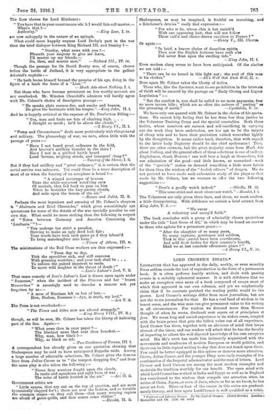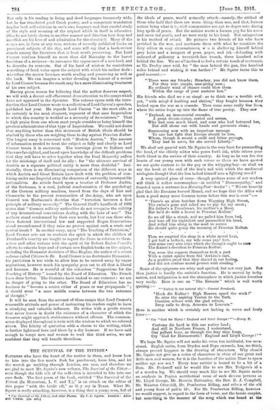LORD CROMER'S ESSAYS.*
LrrxRATErrim that has appeared in the daily, weekly, or even monthly Press seldom stands the test of reproduction in the form of a permanent book. It is often perforce hastily written, and deals with passing events in a suitably ephemeral manner. It is with diffidence that we make an exception once more of a book composed of essays most of which first appeared in our own columns, and yet we emphatically claim that if its contents perished the reading public would ho the poorer. Lord Cromer's writings differ from most journalism, but are not the worse journalism for that. He has a real fund of wisdom in its truest sense, and the wise man can give permanent value to his writing in all circumstances. For wisdom we demand more than Horace thought of when ho wrote, Scribendi reek sapere est et principium et ions. We mean long and varied experience in its widest sense, coupled with the brain-power that gets the fullest value out of all experience. Lord Cromer has these, together with an alertness of mind that keeps abreast of the times, and our readers will admit that he has the faculty of imparting to others the woll-digested knowledge of his own receptive mind. His life's work has made him intimately acquainted with the movements and tendencies of modern European or world politics, and there can be little topical writing to-day that does not touch upon them. Few could be better equipped in this sphere or deserve more attention. Cicero, Julius Caesar, and the younger Pliny were early examples of the combination of the Imperial administrator and the man of letters. Lord Cromer and Lord Curzon are among the most modern examples and maintain the tradition worthily for our benefit. The open mind with which Lord Cromer has worked in India and Egypt as well as in England has contributed to the wisdom that compels our attention when he writes of China, Japan, or even of Java, where, so far as we know, he has never set foot. Three or four of the essays in this series are predomi- nantly literary, and here again Lord Cromer is well qualified as a critic.
• Political and Literary Essays. By the Earl of Cromer. (Third Series.) London : Macmillan and Co. 1101. ed. neLl
Not only Is his reading in living and dead languages immensely wide, but he has translated good Greek poetry, and a competent translation implies both self-criticism in one's own language and that careful study of the style and meaning of the original which in itself is 'educative. (Has he not lately shown in another manner and direction how deep and unselfish are his love of and admiration for the classics?) Many of the earays are, in form at any rate, reviews of recently published books on prominent subjects of the day, and some will say that a book-review stands among the literature that is least worth preserving. But Lord Cromer confines himself no more than did Macaulay to the barest functions of a reviewer—to announce the appearance of a new book and to describe its contents. Out of his fund of wisdom he contributes something of fresh value upon the subject with which his author deals : alicrefore the review becomes worth reading and preserving as well as the book. We can imagine a writer dreading the honour of a review by Lord Cromer because the result may be a more illuminating treatment of his own subject.
Having given reason for believing that the author deserves respect, we will with a decent self-effacement draw attention to the essays which have not appeared in the Spectator. The volume opens with the intro- duction that Lord Cromer wrote to a collection of Lord Curzon's speeches, published last year. He regards Lord Curzon "as tho most able, as ho certainly is the most eloquent, exponent of that sane Imperialism to which this country is wedded as a necessity of its existence." That is high praise from one whom most people consider as being himself the greatest administrator of that type of Imperialism. We could not desire that anything better than this statement of British ideals should be studied by those who are weighing them to-day against Prussian 'Caitiff. The longest essay is concerned with " Modern Austria." Tho amount of information needed to treat the subject so fully and clearly as Lord Cromer treats it is enormous. The warnings given to Italians and Slays are far-sighted, and based upon knowledge of the difficult problems that they will have to solve together when the Dual Monarchy suffers for the misdoings of itself and its ally : for "tho ultimate survival of Austria as a separate political entity is more than doubtful." Inci- dentally, there is an illuminating comparison of the different ways in which Austria and Great Britain have dealt with the problem of com- bining under one Imperial sway the elements of outwardly incompatible nationalities. An article based upon a treatise of Professor Andler, of the Sorbonne, is a cool, judicial condemnation of the psychology of the German military machine, traced from the days of List and Clausewitz to the present commanders of the Army, who act upon General von Hartmann's doctrine that "terrorism becomes a first principle of military necessity." The General Staff's handbook of 1002 states that "German military authorities do not recognize the validity of any international conventions dealing with the laws of war." The authors stand condemned by their own words, but how can those who have fostered international law and supported Hague Conventions stand uncondemned if they raise no protest against such a crude and cynical insult ? In another essay, upon "The Teaching of Patriotism," Lord Cromer sets out to contrast the spirit in which the children of rernhardi's country are taught to regard the State in relation to them- selves and other nations with the spirit of Sir Robert Baden-rowell's efforts to educate boys and of certain new English books on the subject, including the Humanist doctrines cf Miss Hughes, the author of a recent volume called Citizens to Be. Lord Cromer is no doctrinaire Humanist : his patriotism is too virile to allow him to be carried away by vague aspirations, however much his sympathy goes out to all that is liberal and humane. He is scornful of the colourless "Suggestions for the Teaching of History" issued by the Board of Education. The French have done bettor. The Germans have rushed to one extreme : we are in danger of going to the other. The Board of Education has no business to "become a centre either of peace or war propaganda " ; it should steer "a sane middle course between the two extremes of thought."
It will be seen from the account of these essays that Lord Cromer's reasonable attitude and power of instructing his readers ought to have a steadying and valuable influence. He writes with a gentle reason that never leaves in doubt the existence of a character of which the firmness might approach stubbomnees without offence. Tho common- sense displayed throughout is twin with the wisdom to which we referred above. The felicity of quotation adds a charm to the writing, which is further lightened hero and there by a dry humour. If we have said enough to tempt men and women to read this third series, we are confident that they will benefit therefrom.



































 Previous page
Previous page